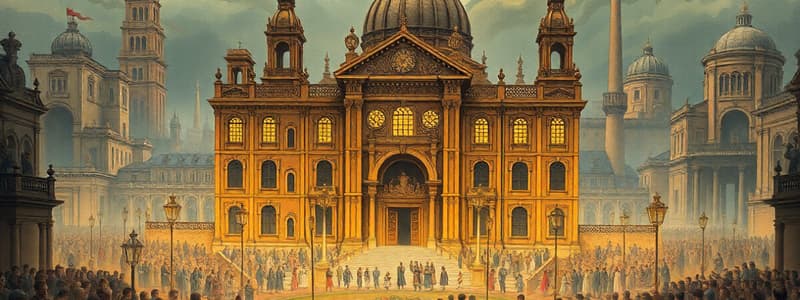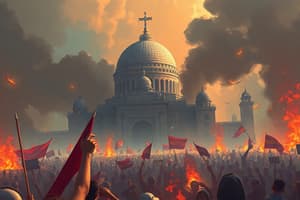Podcast
Questions and Answers
What can extreme policies impact that may lead to civil conflict?
What can extreme policies impact that may lead to civil conflict?
- Cultural diversity
- Political participation
- Economic stability (correct)
- Technological advancement
Which category of policies is likely to generate friction due to restrictions on personal freedoms?
Which category of policies is likely to generate friction due to restrictions on personal freedoms?
- Economic Policies
- Educational Policies
- Social Policies (correct)
- Environmental Policies
What type of economic policy could incite unrest when seen as unfair?
What type of economic policy could incite unrest when seen as unfair?
- Universal basic income
- Progressive tax policies
- Investment in public services
- Extreme tax policies targeting specific groups (correct)
Which of the following political policies could lead to violent resistance?
Which of the following political policies could lead to violent resistance?
What can policies that disproportionately affect certain populations spark?
What can policies that disproportionately affect certain populations spark?
What type of environmental policy is most likely to cause protests?
What type of environmental policy is most likely to cause protests?
How can changes to the electoral system lead to social unrest?
How can changes to the electoral system lead to social unrest?
Which of the following social policies could fuel suspicion between different groups?
Which of the following social policies could fuel suspicion between different groups?
What drives grievances that may lead to civil conflict?
What drives grievances that may lead to civil conflict?
What role does political polarization play in the risk of civil war?
What role does political polarization play in the risk of civil war?
How does government response to dissent affect the likelihood of civil unrest?
How does government response to dissent affect the likelihood of civil unrest?
What can exacerbate existing societal tensions according to the analysis?
What can exacerbate existing societal tensions according to the analysis?
What is the challenge in predicting civil war triggers?
What is the challenge in predicting civil war triggers?
What effect can negative economic policies have on societal groups?
What effect can negative economic policies have on societal groups?
What factor is important for mitigating risks associated with extreme policies?
What factor is important for mitigating risks associated with extreme policies?
Which of the following statements about media and political division is accurate?
Which of the following statements about media and political division is accurate?
Flashcards
Societal Fracture Points
Societal Fracture Points
Policies that significantly impact fundamental rights, freedoms, or economic stability, potentially causing societal divisions and civil conflict.
Extreme Economic Policies
Extreme Economic Policies
Policies drastically altering property ownership, wealth redistribution, or creating extreme tax policies, leading to opposition and unrest.
Job Displacement Policies
Job Displacement Policies
Policies that significantly harm segments of the population through job losses (e.g., automation, globalization) without adequate safety nets.
Extreme Social Policies
Extreme Social Policies
Signup and view all the flashcards
Political Polarization Policies
Political Polarization Policies
Signup and view all the flashcards
Limited Democratic Processes
Limited Democratic Processes
Signup and view all the flashcards
Environmental Policies with High Lifestyle Impact
Environmental Policies with High Lifestyle Impact
Signup and view all the flashcards
Historical Conflict Analysis
Historical Conflict Analysis
Signup and view all the flashcards
Civil War Risk Factors
Civil War Risk Factors
Signup and view all the flashcards
Social Divisions
Social Divisions
Signup and view all the flashcards
Political Polarization
Political Polarization
Signup and view all the flashcards
Government Response to Dissent
Government Response to Dissent
Signup and view all the flashcards
Economic Instability
Economic Instability
Signup and view all the flashcards
Predicting Civil War
Predicting Civil War
Signup and view all the flashcards
Policy Impact Assessment
Policy Impact Assessment
Signup and view all the flashcards
Study Notes
Introduction
- Extreme policies, no matter how well-intentioned, can create societal divisions and potentially trigger civil conflict if they significantly impact fundamental rights, freedoms, or economic stability.
- Analyses of historical conflicts often identify policies exacerbating existing societal tensions.
- Existing frameworks for identifying potential societal fracture points can assess the likelihood of violent conflict arising from extreme policy proposals.
Potential Policy Categories
-
Economic Policies:
- Policies drastically altering property ownership or wealth redistribution schemes are particularly contentious.
- Extreme tax policies, especially those targeting specific groups or industries, could lead to widespread opposition and potentially incite unrest if seen as unfair.
- Policies that significantly harm segments of the population (e.g., job displacement via automation or globalization without adequate safety nets) could generate public anger and support for extreme solutions.
-
Social Policies:
- Policies directly impacting cultural norms, religious practices, or personal freedoms (e.g., restrictions on individual expression) are highly likely to generate friction and disagreement.
- Policies regarding immigration or minority rights could fuel suspicion and tension between different groups, potentially leading to violent conflict.
- Restrictions on abortion or same-sex marriage could trigger strong reactions from those opposing them.
-
Political Policies:
- Policies that severely limit democratic processes or reduce political rights – such as restricting voting rights, suppressing dissent, or granting undue power to certain political figures – increase the risk of violent resistance.
- Policies concentrating significant political power in few hands or creating an environment of political polarization can foster resentment and distrust; this could destabilize society.
- Changes to the electoral system, like vote dilution or gerrymandering, increase the risk of perceived unfairness and disenfranchisement, leading to social unrest.
-
Environmental Policies:
- Policies requiring substantial lifestyle changes (e.g., carbon taxes causing high energy costs, banning certain products, mandated restrictions) could generate substantial opposition, protests, and potentially violent conflict, especially when impacting segments of the population disproportionately.
Factors Contributing to Civil War Risk
-
Existing Social Divisions:
- Deep-seated social and economic inequalities between different segments of society create a breeding ground for grievances, increasing the susceptibility to violent conflict triggered by specific policies.
- Historical grievances or ethnic tensions amplified by extreme policies are highly prone to escalating into civil unrest or armed conflict.
-
Political Polarization:
- The more divided and polarized a society becomes, the greater the risk of policies causing further division, which in turn creates the conditions for heightened social and political instability.
- The presence of widely divergent viewpoints and values on fundamental societal issues fuels extreme responses.
- Increased media fragmentation can further worsen division and perception of opposition groups as enemies.
-
Government Response to Dissent:
- Governments that respond to dissent or criticism with force or repression increase the chance of escalating conflicts significantly.
- Actions perceived as authoritarian or neglecting democratic values further incite tensions.
-
Economic Instability:
- Policies with negative economic implications for a substantial portion of the population (e.g., employment loss or decreased wages) can lead to resentment and potentially support for extremist groups.
Severity and Likelihood Assessments
- Predicting the precise trigger or likelihood of civil war arising from policy is exceptionally challenging.
- Factors such as the specific policies, their implementation, the existing social and political climate, and the government's reaction are crucial determinants.
- Analyzing similar historical events while considering contemporary factors can provide a preliminary assessment of risks.
- A detailed analysis of each case is crucial; broad generalizations are insufficient.
Conclusion
- Extreme policies, depending on various factors, can exacerbate existing societal tensions.
- Understanding the potential impact of extreme policies on social divisions and political stability is essential to mitigating risks.
- Robust mechanisms for public input and mediating contentious issues are vital.
Studying That Suits You
Use AI to generate personalized quizzes and flashcards to suit your learning preferences.




